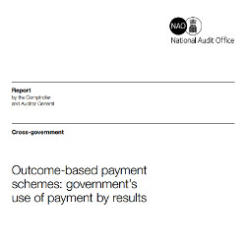Government departments need to understand how charities fit into the delivery of payments-by-results schemes to improve the chances of them succeeding, according to a National Audit Office report.
The NAO published its report on Outcome-based payment schemes: government’s use of payment by results last week after taking evidence from a range of stakeholders including NCVO.
It emphasised that charities "tend to have a lower appetite for risk and lower working capital" than larger private providers and "find it harder to sustain themselves financially in the period between intervention and payment".
The report warns commissioners that they must understand how prime contractors work with subcontractors, an issue that has been of particular concern to the sector.
"It is not enough, therefore, for commissioners to understand just those providers with whom they have a direct relationship; they also need to understand how those providers are likely to work with subcontractors further down the delivery chain," the report said.
The NAO also recommended that the Cabinet Office or the Treasury should be responsible for collecting evidence about different PbR schemes in government.
Amyas Morse, head of the NAO, said: “While its supporters argue that, by its nature, payment by results offers value for money, these contracts are hard to get right, which generates risk and cost for commissioners.
“Payment by results potentially offers benefits such as innovative solutions to intractable problems. If it can deliver these benefits, then the increased risk and cost may be justified, but this requires credible evidence. Without such evidence, commissioners may be using this mechanism in circumstances to which it is ill-suited, to the detriment of value for money.”
Commissioners need a better understanding of charities, says NAO report on payment by results
Government departments need to understand how charities fit into the delivery of payments-by-results schemes to improve the chances of them succeeding, according to a National Audit Office report.










